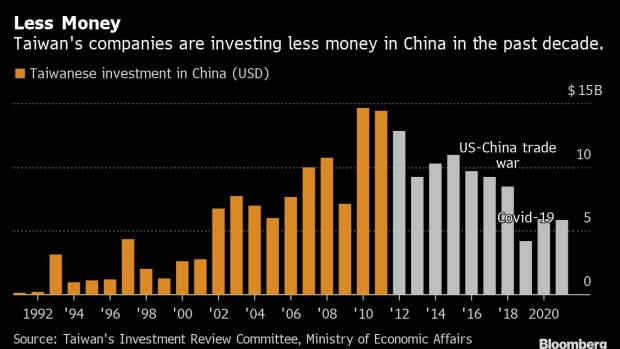Sep 13, 2022
Democracy Crackdown Moved Taiwan Chip Pioneer to Oppose Beijing
, Bloomberg News

(Bloomberg) -- For chip tycoon Robert Tsao, it was a mob attack on Hong Kong democracy activists in 2019 that finally compelled him to turn against China’s rulers.
Tsao, who founded chipmaker United Microelectronics Corp., was living in the city when more than 100 men wielding sticks stormed a train station during that year’s pro-democracy protests, assaulting passengers including activists on a subway car.
That conflict, which later became emblematic of efforts to quash the nascent movement, raised suspicions Hong Kong police had colluded with pro-Beijing gangs. Authorities later cleared police of claims they did little to stop the attackers -- but the controversy persisted.
“I decided then I’ll go public about my anti-Chinese Communist Party stance,” the 75-year-old, who stepped down as UMC’s chairman in 2006, told Bloomberg News on Monday.
Tsao decided to leave Hong Kong that month, he added, knowing that openly opposing the party would prevent him from setting foot in China again, for fear of detention. “I was very shocked,” he said. “The Chinese Communist Party are downright gangsters.”
Read more: Chip Tycoon Vows to Fund Taiwan’s ‘Civilian Army’ Against China
Since then, Tsao has been an outspoken critic of President Xi Jinping’s regime, which has dismantled democratic freedoms in Hong Kong and put increased military pressure on Taiwan, a self-ruled island Beijing considers a breakaway province.
This month, he vowed to donate NT$1 billion ($32.8 million) to help Taiwan’s military train 3 million civilian soldiers and an additional 300,000 marksmen to bolster its defense against a possible Chinese invasion. Those funds are part of a NT$3 billion ($97 million) pledge the tycoon made last month to aid Taiwan in protecting itself.
Tsao also announced he was renouncing his Singaporean passport and reverting to Taiwanese citizenship, which he gave up in 2011.
On Monday, Tsao said he plans to help with local drone development and anti-disinformation programs, without offering specifics. He cautioned that Taiwan cannot assume China won’t attack the island because of its vital chip industry, which makes a majority of the semiconductors that power everything from smartphones to electric cars.
“When the Chinese Communist Party gets crazy it will not care about anything, and it would be risky for Taiwan to think that its chip industry can fend off China,” Tsao said. “Taiwan needs to assume the Chinese Communist Party will eventually attack and prepare accordingly.”
American military commanders estimate Xi could have the capability to take action across the Taiwan Strait in as soon as five years. In June, a senior Chinese economist at a government-run research group called on authorities to seize Taiwan Semiconductor Manufacturing Co. -- the world’s largest contract manufacturer of semiconductors -- if the US hits China with sanctions on par with those leveled against Russia.
Tsao’s declarations of support come as relations across the Taiwan Strait are at their most fraught in decades. After House Speaker Nancy Pelosi became the most senior US official to visit Taipei in a quarter century last month, China’s military conducted drills encircling much of Taiwan and fired missiles directly over its main island in protest.
Despite those political tensions, China remains Taiwan’s largest trading partner and Taiwanese companies’ top overseas destination for investments, although Beijing’s trade war with Washington and Covid lockdowns have seen some firms already relocate manufacturing capacity.
“Taiwanese businesses will not move out from China entirely, but they are changing their ways of doing business,” said Yang Shu-fei, an economist at the Taipei-based Chung-Hua Institution for Economic Research. “They will stay low key, or decrease their shares in Chinese entities, so they become purely investors rather then actual business operators.”
Tsao dismissed concerns Taiwanese companies can’t do without China as a market or a manufacturing base. “The US is now decoupling from China and Taiwan will need to follow,” he said. “Foxconn has shifted some iPhone production outside of China and its component suppliers will need to move, as well.”
When asked about some Taiwanese people’s reluctance to face China’s aggression, Tsao said he’d use his funds to help build consensus in the democratic island.
“I will devote the rest of my life to defending Taiwan,” he said. “I will not live to see Taiwan become Hong Kong.”
©2022 Bloomberg L.P.





